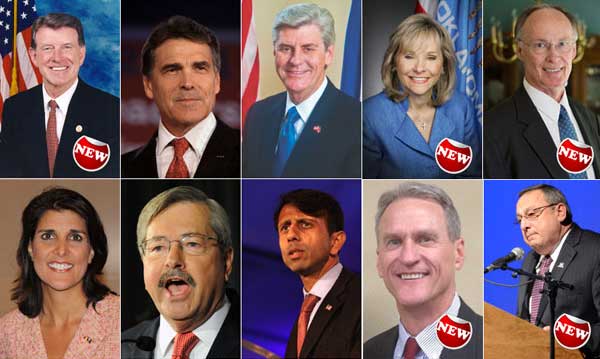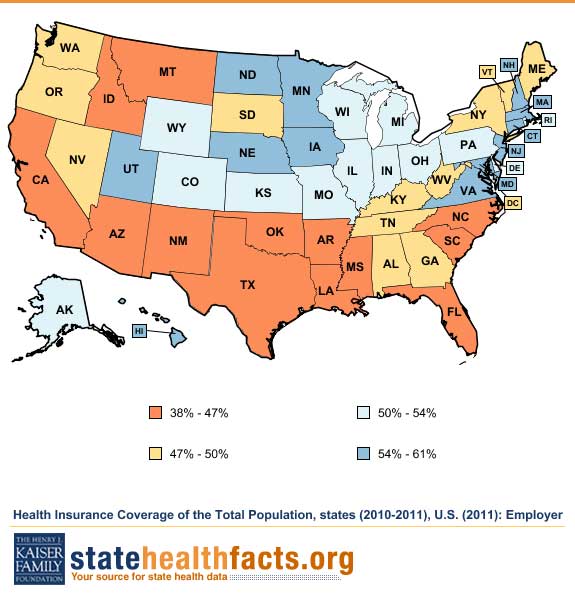
A growing number Republican Governors are refusing to expand their state Medicaid programs. The Supreme Court weakened the Medicaid expansion written into the Affordable Care Act, when it ruled that the federal government can’t penalize states that refused the expansion by withholding their existing Medicaid funding. That made it easier for conservative governors to withhold lifesaving access medical to the poor and uninsured in their states.
Since the last time I wrote about this subject, four more Republican governors have joined what amounts to GOP’s own death panel.
Republican governors are standing up for a conservative health care reform principle articulated by conservative economist Tyler Cowen.
2. A rejection of health care egalitarianism, namely a recognition that the wealthy will purchase more and better health care than the poor. Trying to equalize health care consumption hurts the poor, since most feasible policies to do this take away cash from the poor, either directly or through the operation of tax incidence. We need to accept the principle that sometimes poor people will die just because they are poor. Some of you don’t like the sound of that, but we already let the wealthy enjoy all sorts of other goods — most importantly status — which lengthen their lives and which the poor enjoy to a much lesser degree. We shouldn’t screw up our health care institutions by being determined to fight inegalitarian principles for one very select set of factors which determine health care outcomes.
First, there were six.

Meet the newest “Death Panel” on the block.
They are the six Republican governors who have vowed refuse the Medicaid expansion that will happen most other states, under the Affordable Care Act — Rick Scott (FL), Rick Perry (TX), Phil Bryant (MS), Nikki Haley (SC), Terry Branstad (IA), and Bobby Jindal (LA). These Republican governors are opening the “trap door” that the Supreme Court installed in the Affordable Care Act, even at it upheld most of the law. But it’s the poorest residents in these states, many of whom are African American and Latino, and who would have gained health coverage and access to care, that will fall through that trap door.
Now there are ten. Meet the newest members of the GOP Governors’ Death Panel (indicated below).

They are: C.L. “Butch” Otter (ID), Rick Perry (TX), Phil Bryant (MS), Mary Fallin (OK), Robert Bentley (AL), Nikki Haley (SC), Terry Branstad (IA), Bobby Jindal (LA), Dennis Daugaard (SD), and Paul LePage (ME).
As of Monday, Idaho’s C.L. “Butch” Otter became the newest member of the GOP Governor’s Death Panel.
Idaho won’t expand Medicaid to cover more poor people under President Barack Obama’s health care reform law, Gov. C.L. “Butch” Otter (R) told legislators during his State of the State address on Monday.
Otter is the 10th Republican governor to reject extending Medicaid health coverage to more poor residents. The governor’s decision contradicted a unanimous recommendation from a commission appointed by Otter that the state take advantage of the available federal funding to broaden Medicaid.
… Idaho could add 88,000 poor people to Medicaid under the Obamacare expansion, and 19,000 people already eligible under today’s rules, but not enrolled, also may sign up for coverage, the report says. The state would spend an additional $261 million from 2013 to 2022 to cover these individuals and the federal government would send $3.7 billion to Idaho.
Otter’s rejection of the Medicaid expansion follows his decision to adopt another major element of Obamacare. Last month, Otter was one of just three Republican governors who said he intends to establish a health insurance exchange in his state under the law.
According to StateHealthFact.Org, there are about 280,700 uninsured Idahoans (18% of the state’s population). Iowa could cover about 107,000 of its uninsured, with the federal government picking up something like 99% of the cost.
But Gov. Otter said “No.”
Florida governor Rick Scott has since moved into the “undecided camp,” according to the this handy resource from the Advisory Board Company on where the states stand on the Medicaid expansion. (It’s the most up-to-date I’ve found so far.)

Via: The Advisory Board Company
Scott declared back in June that Florida would not expand its Medicaid program. Perhaps Scott had a change of heart, once the election outcome made it clear that neither the president or health care reform were going away. Maybe Scott no longer believes his own overblown estimates about how much the expansion would cost Florida. In any case, this week, Scott sat down with HHS Sec. Kathleen Sebelius to talk about whether Florida will expand its Medicaid program and set up its own health insurance exchanges.
Iowa’s Terry Branstad is still a member of the club. The Advisory Council Company put Branstad on the “Leaning Toward Not Participating List.” I’m leaving him GOP Governor’s Death Panel member in good standing, because it seems unlikely that Branstad will change his mind. In November, Branstad was one of 11 Republican governors who asked the Obama administration for leeway to implement partial Medicaid expansion in their states, while getting 100% of the federal funding for full expansion. In December, the Obama administration said “No” to partial expansions. States must fully implement Medicaid expansion in order to get full funding.
Many of these states have the highest percentages of uninsured in the country. Texas, South Carolina, Louisiana, Georgia, Florida, and Mississippi are among top ten states with the highest percentages of uninsured.

All of members of the GOP Governors’ Death Panel offer the same excuse for refusing to expand Medicaid in their states, or wanting to get full federal funding for a partial expansion. (What they would then do with the rest of that funding, I’ve no idea.) They say “We can’t afford it,” but they lie.
In most cases, these the Medicaid expansion would mean a significant reduction in the number of uninsured, at a modest cost to the states. They might even save money.
Expanding Medicaid health benefits to everyone eligible under President Barack Obama’s health care reform law would increase state spending on the program by just 3 percent while extending health coverage to more than 20 million people, according to a study released Monday by the Henry J. Kaiser Family Foundation and the Urban Institute.
The health care law seeks to enroll into the Medicaid program anyone who earns up to 133 percent of the federal poverty level, which is $14,856 this year. But when the Supreme Court upheld the law in June, its decision allowed states to opt out of the Medicaid expansion. So far, Republican governors in eight states have declared they won’t participate, denying health care coverage to millions of their poorest residents.
… The total cost of the Medicaid expansion would be $1.03 trillion between 2013 and 2022, according to the study. States would pay $76 billion of that, which amounts to a 2.9 percent increase compared to what states would have spent on Medicaid if the health care reform law hadn’t been enacted. Under the health care reform law, the federal government will pay the full cost of covering newly eligible people on Medicaid from 2014 to 2016, then will scale back funding to 90 percent in 2022 and later years.
In addition to receiving a large federal subsidy to enroll these uninsured residents, states that expand Medicaid would be able to reduce spending on taxpayer-funded programs to help hospitals and other health care providers cover the cost of so-called uncompensated care, or unpaid medical bills. If Medicaid expanded across the country, states would save $18 billion between 2013 to 2022 , according to the study.
Republican governors’ refusals to expand Medicaid will cost lives. It’s been shown that expanding Medicaid saves lives.
A new study from Harvard School of Public Health (HSPH) finds that expanding Medicaid to low-income adults leads to widespread gains in coverage, access to care, and—most importantly—improved health and reduced mortality. It is the first published study to look specifically at the effect of recent state Medicaid expansions on mortality among low-income adults, and the findings suggest that expanding coverage to the uninsured may save lives.
…The results showed that Medicaid expansions in three states were associated with a significant reduction in mortality of 6.1% compared with neighboring states that did not expand Medicaid, which corresponds to 2,840 deaths prevented per year for each 500,000 adults gaining Medicaid coverage. Mortality reductions were greatest among older adults, non-whites, and residents of poorer counties. Expansions also were associated with increased Medicaid coverage, decreased uninsurance, decreased rates of deferring care due to costs, and increased rates of “excellent” or “very good” self-reported health.
The groups that benefitted from Medicaid expansion in this study—older adults, racial and ethnic minorities, and those living in poor areas—are groups that have traditionally had higher mortality rates and faced greater barriers to care. The study results provide valuable evidence for state policymakers deciding whether or not to expand Medicaid, say the authors.
“Sometimes the political rhetoric is at odds with the evidence, such as claims that Medicaid is a ‘broken program’ or worse than no insurance at all; our findings suggest precisely the opposite,” said Epstein.
But 10 Republican governors are opting to deny the poor in their states health care they might otherwise get. (Care they would get if they lived in any of the other states that are expanding their Medicaid programs.) That means denying people like Laura Johnson in Louisiana.
With no health insurance and not enough money for a doctor, Laura Johnson is long accustomed to treating her ailments with a self-written prescription: home remedies, prayer and denial.
Over decades, she made her living assisting elderly people in nursing homes in jobs that paid just above minimum wage and included no health benefits. So even as her feet swelled to such an extent that she could no longer stuff them into her shoes, and even as nausea, headaches and dizziness plagued her, she reached for the aspirin bottle or made do with a teaspoon of vinegar. She propped her feet up on pillows and hoped for relief.
…After she collapsed last year and landed in in a local emergency room, doctors diagnosed her with congestive heart failure, high blood pressure and hypothyroid. They ordered her not to work. She arranged a Social Security disability benefit, and she enrolled in Medicaid, the government-furnished insurance program for the poor. She used her Medicaid card to secure needed prescription medications. Her ailments stabilized.
But this year, the state determined that the $819 a month she draws in disability payments exceed the allowable limit. By the federal government’s reckoning, her $9,800 annual income made her officially poor. But under the standards set by Louisiana, she was too well off to receive Medicaid.
This is how Johnson, 57, finds herself back amid the roughly 49 million Americans who lack health insurance. This is why she must again reach into her pocket to secure her prescription drugs, a supply that runs about $200 a month. That sum is beyond her, so she has gone more than four months without taking her pills on a regular basis. Once again, her feet are swelling and her chest is filling with fluid. Once again, she is confronted with the realization that a lifetime of labor does not entitle her to see a doctor any more than it enables her to gain crucial medications.
“It just doesn’t seem right to me,” she said. “It just doesn’t seem fair.”
Johnson is precisely the sort of person who is supposed to benefit from the national health care reform now known as Obamacare. The law championed by President Obama and enacted by Congress nearly three years ago includes a dramatic expansion of Medicaid. In place of the patchwork of eligibility levels now set by each state, one standard is to prevail everywhere: Individuals with annual incomes up to 133 percent of the federal poverty line — currently, $14,856 or less — are supposed to be able to enroll.
Multiply Laura Johnson by the more than 6 million people who will be left without access to coverage in states that reject the Medicare expansion. Maybe half of them will get access to care from health insurance exchanges starting in 2014, but according to the CBO the other 3 million will face a “bleak outlook.”
The net result is that 6 million fewer people will have access to Medicaid coverage in 2022 than projected in March, before the Supreme Court ruling.
The latest CBO estimate “confirms the bleak outlook” for those who don’t have access to affordable health care now, said Bruce Siegel, MD, president and chief executive officer of the National Assn. of Public Hospitals and Health Systems, in a statement. “They might not be able to count on the promise of health care reform to help them, and the safety net on which they rely will struggle to meet their needs.”
Not all of the 6 million people shut out of the Medicaid expansion are expected to remain without coverage. An estimated 3 million of them will have access to subsidized coverage through the health insurance exchanges that also will launch in 2014. The other 3 million people in this equation would remain uninsured.
Yet, Republican Governor’s like Bobby Jindal are choosing to deny people like Laura Johnson health care. Bobby Jindal says Louisiana can’t afford to expand Medicaid so that people like Laura Johnson can get the medical care they need (outside of an emergency room, anyway). Again, that’s a lie.
In Louisiana, Governor Bobby Jindal has said the state can’t “afford another entitlement program.” But his state also allows residents to deduct 100 percent of their federal income tax payments from their state taxes. If it didn’t, it would raise $642 million a year—or $3.9 billion over six years. By getting rid of this tax break for the rich, Louisiana could newly insure 366,000 people by 2019, at a cost of just $337 million to the state, more than eleven times over.
Jindal won’t even accept federal money to make sure that people like Laura Johnson have access to health care.
There’s no fiscal justification for this, and no moral justification either.
When a policy change is being debated, it’s not unreasonable to say that you oppose this particular change because the change you’d like to see is a different one, even if your preferred change isn’t going to happen any time soon. But that’s not the choice. The choice these governors face is between people having no health insurance, and people getting covered through Medicaid. And what they’re saying to their own citizens is: I’d rather you have no health coverage than get covered through a government program. And if you get sick or get in an accident, well, maybe you should have thought of that before you went getting all poor.
There are people who believe that eventually even the likes of Rick Perry will be unable to resist all the money the federal government is offering, so these governors will bluster for a while but take it in the end. But I’m not so sure. That would require them to give a crap about the welfare of the people of their states. And there isn’t a whole lot of evidence for that.
The only justification is ideological. From their perspective, these Republican governors are standing on principle. Unfortunately for many in their states, The principle they stand on is the one I quoted earlier, from Tyler Cowen,
We need to accept the principle that sometimes poor people will die just because they are poor.
Or, to put it simply, “Let them die.”
And that’s why the real “Death Panel” are the Republican Governors who are “standing in the hospital/clinic door” by refusing to expand Medicaid and thus extend health care to the poor an uninsured in their states.